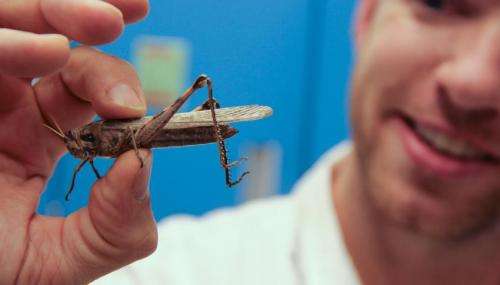Ecopesticides uses fungi to stop crop destroying insects

A New Mexico startup company has begun field tests to prove they can kill desert locusts in Africa using a natural bio-pesticide technology developed at the University of New Mexico. The company, founded by two UNM physicians, is taking on one of the oldest problems in history, the desert locust swarms that can completely destroy food crops in Africa.
They plan to kill the locusts by getting them to eat fungi that are naturally lethal to them. The idea is to encase the fungi in tiny spheres and spread them on fields of crops. The polymer spheres protect the fungi, which thrive in cool dark, humid places, from the dryness and ultraviolet rays of the desert sun until the locusts arrive in the fields. The locusts begin eating the fungi along with the crops and die.
"It's all about timing," Chief Science Officer of Ecopesticides Ravi Durvasula said. "If we could find a way basically to protect those natural compounds, those fungi a little longer - How much longer? A week longer, two weeks longer? We don't know until we test it in the sites in Africa.
"But if we can have it last a little longer, presumably you would need to use less of it. And in these are subsistence farms, where literally every dollar counts, being able to put it out less frequently, maybe being able to store it a little bit longer would help. So we are trying to develop some heat tolerance as well. It would make a huge difference in this part of the world. And so that's really the goal."
The technical problem for Ecopesticides, Adam Forshaw, chief technical officer, said, is to find ways to keep the fungi alive and thriving as long as possible before the locusts arrive.
"The biggest problem with the bio-pesticide solution is that when you spray them into the environment, they are rapidly inactivated by ultraviolet light and by desiccation," Forshaw said. "So we modified the polymer system a little bit and then we doped it with ink that has a very high resistance to ultraviolet light. We've shown - at least in the laboratory and now beginning in our field tests - that we can extend it almost indefinitely, until the bacteria or the fungus naturally dies."
The Bill and Melinda Gates Foundation is responsible for inspiring two physicians in New Mexico to think about locusts in Africa. The foundation has a major initiative to increase food security in Africa and the opportunity for a grant turned Durvasula and Forshaw's interest from the human impact of disease carrying insects to the human impact of crop destroying insects.
How physicians in New Mexico began thinking about locusts in Africa
Durvasula is a physician and the director of the Paratransgenesis Lab in the Department of Internal Medicine at the Health Sciences Center at UNM. His research interest is exploring ways to genetically alter bacteria that can be inserted into insects to interrupt the infectious agent that allows transmission to humans. He began his research and teaching at Yale University more than a decade ago, eventually moving to UNM.
He was pleased to welcome Forshaw, a medical student with a background in chemistry, to his lab in 2012. Forshaw was doing the research portion of his medical degree and together, they went to work to find a way to disrupt the way sandflies transmit Leishmania parasites to humans. Durvasula was able to control the parasite in the laboratory, but the challenge was to control it in the field. Forshaw thought they might be able to use a chemical polymer to create small capsules to encase bacteria that transmit disease into insects.
That's when the Gates Foundation grant opportunity turned the research in a different direction. Forshaw and Durvasula saw that their interest in controlling parasitic pests could be shifted to controlling crop destroying pests.
"We were two medical doctors, you know, changing to locusts and food. It's important because one of the things that I do for UNM is head the Center for Global Health, which is based in our Department of Internal Medicine," Durvasala said. "The Gates Foundation is probably one of the pioneers in understanding the link between food and health. When you look at something like the locust plague that occurred in Tanzania a few years ago, the health implications of that are staggering. It beats the problems of tuberculosis and HIV combined because the locusts wipe out the food."
Their solution works in the laboratory. And it is working in initial field tests of caged desert locusts in Tunisia and Ethiopia. Durvasula and Forshaw are working with the National Institute of Agronomy in Tunisia and the Desert Locust Control Organization of East Africa. The next step is to try it in actual farm environments.
In the meantime, they have patented their application method, leased it from STC.UNM, found financial help and entrepreneurial business expertise with the aid of the New Mexico Angels and launched Ecopesticides International. The company is positioning itself to present a commercial solution to the desert locust problem if the field tests are successful.
The researchers are also working with the U.S. Department of Agriculture in Montana to do field testing against the American grasshopper – a close relative of the desert locust. The U.S. Environmental Protection Agency is interested, but the President of Ecopesticides Les Stewart said registering their process with the EPA and receiving approval will probably take about three years. Ecopesticides International will have to prove it can kill the insects without harming the humans who will eventually eat the crops.
Stewart said lab tests have already shown the bio-pesticide works better than other alternatives on the market. The research team is cautiously taking it one step at a time. First prove the technology works as they think it will, in the natural environment, then be prepared to manufacture when the time is right.
Provided by University of New Mexico


















